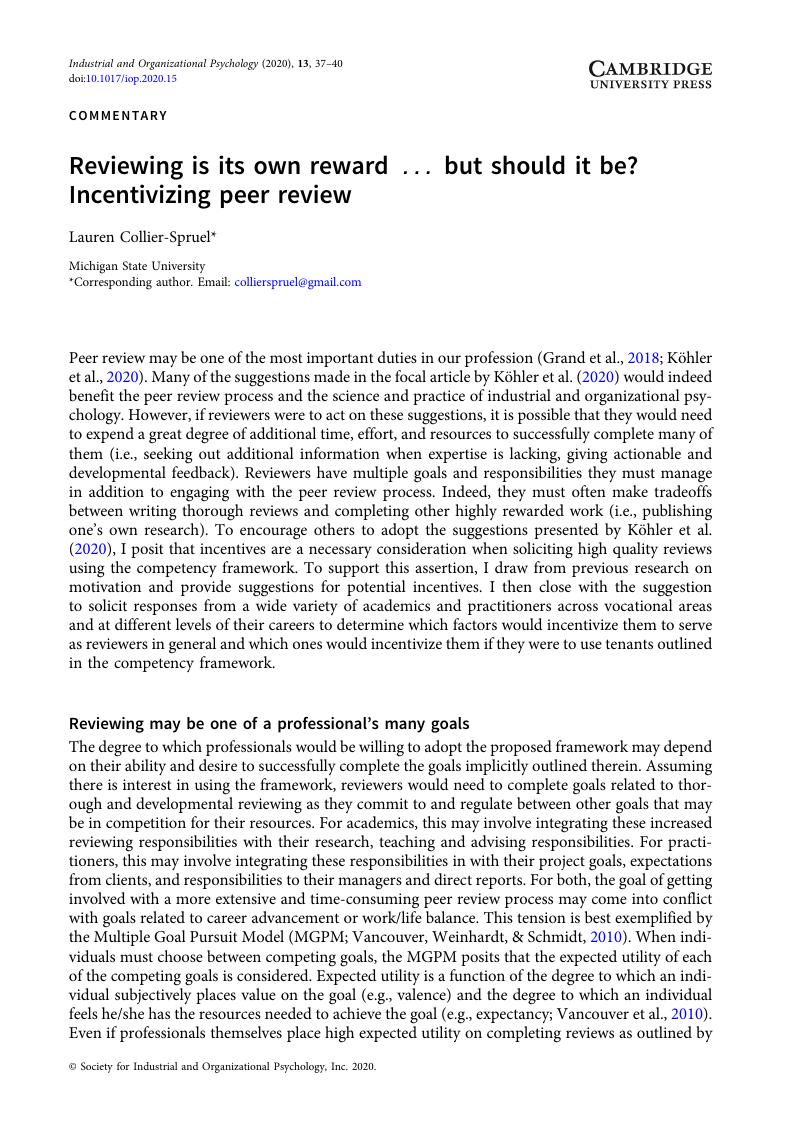No CrossRef data available.
Article contents
Reviewing is its own reward … but should it be? Incentivizing peer review
Published online by Cambridge University Press: 01 May 2020
Abstract
An abstract is not available for this content so a preview has been provided. Please use the Get access link above for information on how to access this content.

- Type
- Commentaries
- Information
- Copyright
- © Society for Industrial and Organizational Psychology, Inc. 2020
References
Annesley, T. M. (2012). Seven reasons not to be a peer reviewer—and why these reasons are wrong. Clinical Chemistry, 58(4), 677–679.CrossRefGoogle ScholarPubMed
Deci, E. L., & Ryan, R. M. (2000). The “what” and “why” of goal pursuits: Human needs and the self-determination of behavior. Psychological Inquiry, 11(4), 227–268. doi: 10.1207/S15327965PLI1104_01CrossRefGoogle Scholar
Grand, J. A., Rogelberg, S. G., Allen, T. D., Landis, R. S., Reynolds, D. H., Scott, J. C., … Truxillo, D. M. (2018). A systems-based approach to fostering robust science in industrial-organizational psychology. Industrial and Organizational Psychology: Perspectives on Science and Practice, 11(1), 4–42. doi: 10.1017/iop.2017.55CrossRefGoogle Scholar
Johnston, D. (2015). Peer review incentives: A simple idea to encourage fast and effective peer review. European Science Editing, 41(3), 70–71.Google Scholar
Köhler, T., González-Morales, M. G., Banks, G. C., O’Boyle, E., Allen, J. A., Sinha, R., … Gulick, L. M. V. (2020 ). Supporting robust, rigorous, and reliable reviewing as the cornerstone of our profession: Introducing a competency framework for peer review. Industrial and Organizational Psychology: Perspectives on Science and Practice, 13(1), 1–27.Google Scholar
Ryan, R. M., & Deci, E. L. (2000). Self-determination theory and the facilitation of intrinsic motivation, social development, and well-being. American Psychologist, 55(1), 68–78. doi: 10.1037/0003-066X.55.1.68CrossRefGoogle ScholarPubMed
Schmidt, A. M., & DeShon, R. P. (2007). What to do? The effects of discrepancies, incentives, and time on dynamic goal prioritization. Journal of Applied Psychology, 92(4), 928–941. doi: 10.1037/0021-9010.92.4.928CrossRefGoogle Scholar
Vancouver, J. B., Weinhardt, J. M., & Schmidt, A. M. (2010). A formal, computational theory of multiple-goal pursuit: Integrating goal-choice and goal-striving processes. Journal of Applied Psychology, 95(6), 985–1008. doi: 10.1037/a0020628CrossRefGoogle ScholarPubMed


